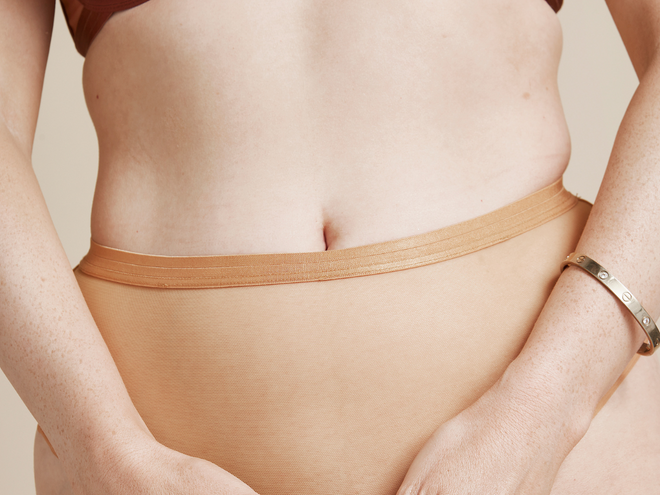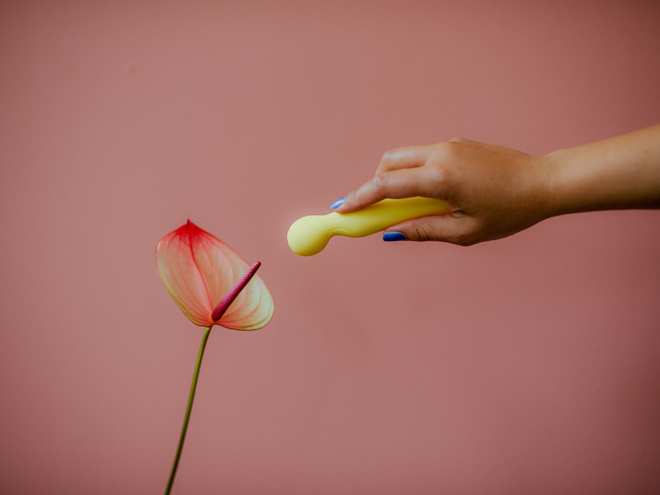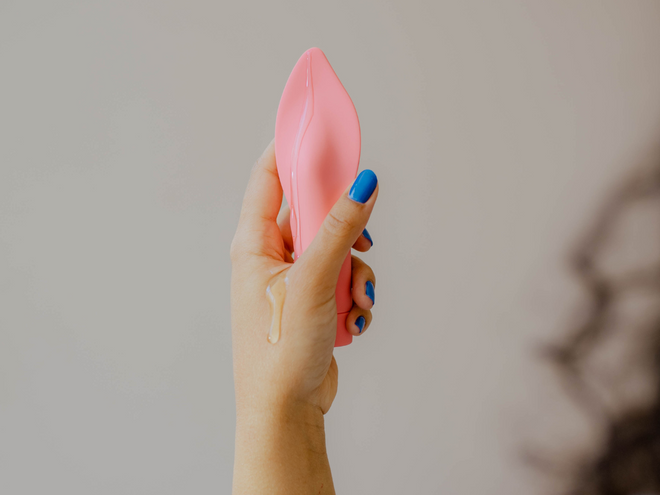Sexuality evolves throughout our lives.
We grow, and we get to know ourselves better. For those that menstruate, certain experiences can mean rediscovering our body again and again: puberty, pregnancy, childbirth, and menopause. These life moments can change the way we experience pleasure and sex - and many of them don't get talked about enough for us to know what's to come or what's happening.
Here's what we've learned about menopause from experts and sex therapists...
1. Get to know hormones.
Just like pleasure is missing in sex ed lessons for vulva owners, hormonal changes are missing in biology lessons for menstruators. We’re not taught anything about how our hormones will impact our wellness - on a day-to-day, cyclical, or throughout lives (for the rest of our lives) level.
Menstruators are often made aware of hormone cycles and menopause (and PMS, for example) in such a negative light - ‘this happens, and it sucks.’ But, it doesn’t have to suck. Tuning into our bodies and understanding the power hormones have; physically, mentally, and emotionally - and learning to work with them, not against them, is an essential part of self-discovery.
The hormone app, Moody, views menopause as a hormonal rebirth - a point of celebration that should include cake on anniversaries. This switch in perspective is exciting and much needed in the menopause chat.
2. The real definition of menopause.
Etymologically, menopause means “period ending.” This term refers to the time when the ovaries stop producing estrogen and progesterone, the hormones needed for reproduction. When someone goes through menopause, they stop ovulating - thus, estrogen production ceases.
But estrogen is not just a sex hormone for reproduction and menstruation. The hormone, also called oestrogen (to make it even more confusing), regulates other bodily processes, such as bone growth, collagen production, cell hydration, and metabolism. It even affects the part of the brain that controls emotion.

3. When menopause happens.
The term menopause is broadly used, despite the fact it is just one moment in a big phase of a menstruator's life.
- Perimenopause. The time of life leading up to your last period, it can last 2-12 years.
- Menopause. It's a one-day event that marks the 12th month anniversary of your last period.
- Postmenopause. Your body is no longer ovulating. Perimenopausal changes settle over the years.
The menopause day can come naturally with age or be induced via medical treatment - including ovary removal surgery, chemotherapy, and genetic experiences. The average age to experience menopause is 51, but early and premature menopause is also possible. Menopause isn't something menstruators should only learn about when going through it or at a certain age, especially when it can be experienced at many ages!
4. The significance of perimenopause.
‘We can actually call perimenopause, the second puberty because so many of the symptoms are similar to during the puberty time, where we are ovulating isn't as regular and we may have higher estrogen to progesterone levels. So they're very similar symptoms of mood swings, heavy periods or boobs can happen during your puberty years and also through your perimenopause years.’ Tara Ghosh, period educator.
So, menopause is technically just a one-day event. And, we’re often not taught about the time before called perimenopause. This happens while a person still menstruates and can naturally start in their late 30s. It’s like a run-up to the last period, our body slowing down and regulating itself to prepare for the next stage of life - similar to puberty being a run-up to menarche, the first menstrual bleeding.
According to a Canadian Endocrinologist, Dr. Jerilynn Prior, a person is likely to be perimenopausal if they have three of these nine changes, even if their cycle is regular.
- Heavier flows
- Shorter cycles
- Sore breasts
- Sleep problems
- More period cramps
- Night sweats of hot flashes
- Migraines
- Mood swings
- Weight gain without changes to exercise or diet
‘Perimenopause has a soft start, these changes subtly come in over a number of months and years.’ Tara Ghosh, period educator.
5. The symptoms of menopause.
Each person in their menopausal years, peri or post, experiences them differently. Some menstruators who experience endometriosis, strong period cramps etc might find some sweet relief in menopause, whereas others may experience discomfort and pain they are not used to.
The impact of no estrogen in the body can cause physical and emotional changes such as;
- Mood imbalances. Feeling irritable, having out-of-character emotional reactions, fatigue, anxiety, or depression.
- Physiological changes. Muscle mass loss or weight gain, vaginal dryness, urinary incontinence.
- Physical stresses. Sleeplessness, hot flashes, night sweats, and migraines.
‘The hormonal changes can have a significant impact on your mental health. So you can start to feel more anxious, you can start to feel more irritable, you can have a loss of libido.’ Emma James, physiotherapist.

6. Menopause's impact on pleasure.
'There's a lot you can do to work with these changes. It's basically about creating a holistic approach. It's more about understanding and taking control of the fact that yes, these things can happen, but we can enjoy sex and pleasure.' Emma James, physiotherapist.
The changes and symptoms caused by the fall in hormone production can also impact sex life, but it's worth noting that lots of things affect our experiences of pleasure and sex! For many people who menstruate, most of life will be post-menopausal - and we're here to tell you that pleasure is a lifetime right. We discover ourselves sexually, over and over again - menopause is just one of many times menstruators do that. This perspective and valuing sexual wellness gives space to appreciate and understand the body and creates opportunities to fulfil our pleasure potential, always.
So, what things are essential to consider regarding sexual wellness and menopause?
Pelvic floor health.
The pelvic floor is a group of muscles that act as a sling to support organs such as the bladder, bowel, and uterus (hey, incontinence menopause symptom). The muscles also assist with sexual function.
Changes in estrogen levels can cause atrophy. This is when muscles get smaller, and therefore the blood and nerve supply to the region is less too. This can impact lubrication, engorging of our pleasure anatomy like the labia and clitoris, and less powerful vaginal contractions triggered by orgasm. So, decreased sensations in different ways.
‘The muscle is smaller, the blood supplies less, and the nerve supplies less so physically, often, orgasms are less intense, things feel drier, and pleasure is experienced differently.’ Emma James, physiotherapist
Natural lubrication and blood flow.
Less natural vaginal lubrication can make physical stimulation uncomfortable; friction is the main cause of painful sex, especially penetrative. Reduced blood circulation to the vaginal, clitoral, and vulvar tissues can make them more delicate, which can cause discomfort.
Vulval appearance.
All vulvas are unique, and just like the rest of our bodies, they change in appearance over time. Muscle mass changes mean the labia can get thinner.
A new libido.
Libido, or sex drive, is the desire or want for sexual experiences - and it is not in one consistent gear forever. Sure, the biological and hormonal changes during menopause affect libido, but so do other mental and environmental factors. Anxiety, stress, dealing with the symptoms, relearning about the body, medication, routine…
'While it is true that hormonal disturbance can play an indirect role in the loss of desire, other external factors can influence it to a larger extent: routine, stress, seeing children leaving the house and parents growing older... Focusing on menopause can prevent you from considering other possible causes of these changes in mood and libido.' Charlotte Creplet, sex therapist.

7. Ways to adapt to menopause and post-menopause.
There are a lot of changes menstruators face when they experience menopause, and it affects the body and mind differently for everyone; the key is to adapt to this new phase of life - sexual discovery happens now and beyond! Pleasure (solo or partnered) doesn’t go away during perimenopause and after menopause.
‘Really I think we need to take a step back and say actually a third of vulva owners report sexual problems, with lack of desire being a major one, so this isn’t just a menopause issue. Many vulva owners aren’t satisfied with their sex lives. Being aware of sexual wellness, and understanding it’s a huge part of our overall health will help when in our perimenopause or postmenopausal years.’ Tara Ghosh, period educator.
Sometimes, it is actually easier to find than ever before. Hear us out. The older we get, the better we know ourselves sexually; the more we know what we enjoy, and have more confidence to seek that out. Plus, periods and contraception are no longer a worry!
Here are a few things to elevate sex during and after menopause…
- Lubricant. Replace the loss of natural lubrication with a lube made from natural ingredients. It helps with cushioning, sliding, and general feel-good sensations!
- External stimulation. Playing with the clitoris during partnered sex not only facilitates lubrication but also leads to more orgasms for people with vulvas than penetration does.
- Masturbation. Solo time is incredibly important for self-discovery, always, and will help with stress relief too.
- Sensorial play. There are other ways to stimulate our sexual selves beyond physical or genital stimulation. Try massage oils, tapping into scent memory, or reading erotica to find pleasure instead.
- Don’t let pain persist. Remember that the vagina registers both positive and negative experiences, which can impact desire. Settling for discomfort could decrease libido. Use lube.
- Pelvic floor care. Understanding how menopause impacts the pelvic floor muscles is one of the best ways to support pleasure anatomy. Exercises and practices can support this.
- Hormone replacement theory. HRT is a way to supply the body with estrogen and can be taken systematically via a pill, or locally via cream applied to the vulva. Always consult with a doctor.
- Ask the experts. Call upon specialized people to talk to. As vulva owners, general health care doesn’t always prioritize our experiences, so working with physiotherapists, sex therapists, or hormonal coaches can be really empowering and mind-opening!
‘HRT can help with symptoms, but it's not to be taken in isolation. We do need to look at how our diet is, how our stress levels are, what is our gut and liver health like? All these things are really important to support us to be healthy through our perimenopause and postmenopausal years, because really, we're living up to 40 years past our menopause. So we want to make sure that we're healthy, not just around menopause, but for a long time after.’ Tara Ghosh, period educator.
Join us in lubing up the conversation around menopause, to make sure this part of many vulva owners' lives is spoken about openly and unapologetically! Whether you menstruate, used to, or never have - what do you know about menopause? What do you want to know more about? Have you experienced it? Or, witnessed someone else experience it? Share your menopause thoughts and stories here.
More menopause resources.
Watch.
Davina McCall: Sex, Myths and the Menopause
Read.
Moody: A Woman's 21st-Century Hormone Guide by Amy Thomson







